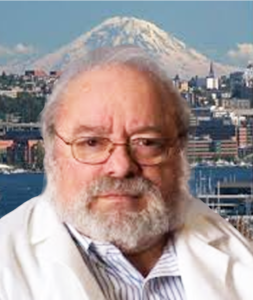
I am telling my story for two reasons. First because I am proud of my life and career. Second, because I believe strongly that abuse of the kind I have received needs to be stopped.
I have filed a complaint against the UW administration for its violations of the law and harm done to me by false accusations even after the administration’s investigators exonerated me. This biography explains why I feel so strongly about my reputation.
Stephen M. Schwartz Professor of Pathology Adjunct Professor of Bioengineering and Cardiology
MOVING TO SOUTH LAKE UNION
Paul Ramsey, CEO of UW Medicine
My recent problems began over seven years ago when the Dean of the School of Medicine, Paul Ramsey, asked me to move my program to the new South Lake Union campus. Dr. Ramsey, knowing my long success with training investigators, explicitly said he wanted to take advantage of my skills as a mentor.
Though flattered. I did not want to go. I am a basic scientist with feet in areas like genetics, cell biology and developmental biology. From the beginning, programs at SLU seemed to me to be applied biology more relevant to the Department of Medicine and clinical research than to my research. While Dean Ramsey was interested in creating a heart stem cell program under my protégé, Charles Murry, Dr. Murry’s program is largely about the myocardium while my interests are in blood vessels. Unfortunately, none of the basic scientists in developmental biology, genetics, structural biology genetics, membrane biology and other areas of excellence on main campus areas were willing to move to SLU and few of the vascular biology faculty were willing to go. These fields are highly synergistic with each other as well as with areas like computer science, biology, statistics and chemistry located on the main UW campus. Even the corporations most relevant to my interests, AMGEN, Rosetta/Merck, and Zymogenetics, have left SLU or failed. The state’s idea of SLU as a biotech hub to rival Boston, Palo Alto, San Francisco, San Diego, Cambridge/Boston, or Philadelphia has failed. While we do have a few small companies, biology at SLU has become a home to nonprofits like the UW’s campus, the exciting new campus supported by Children’s and the non-UW affiliated institutes created by Paul Allen. These places are in south Lake Union mainly because of the Hutch and the availability of land. The Hutch, led by scientists rather than administrators, is the real core of science at the south end of Lake Union. Seminars at the Hutch and on main campus are rarely posted at SLU and the bus ride back to main campus means that attending a one-hour seminar takes two to three hours.
 The city, of course, now sees SLU as the home of Amazon.
The city, of course, now sees SLU as the home of Amazon.
When I expressed my concerns seven years ago, Dean Ramsey told me that I would be able to move back to main campus at my choice if things did not work out. They did not work out. Of the few vascular biology collaborators who did move, all either went on to retire, die prematurely or, in the case of a few people we recruited to SLU, soon decided to leave for other institutions. Currently, SLU has no expertise in Genome Sciences, the area most relevant to my current research interests. Despite multiple requests, Dean Ramsey has refused to keep his promise.
My situation became worse when a Center Director at SLU became derisive, making demeaning comments about me in public settings. The Director went further and unilaterally took over the weekly seminar program, “Breakfast Club” that I had run as part of my Cardiovascular Pathology training grant (CVP) for 38 years. Breakfast Club had always been focused on cutting edge biology and, as a result, was widely attended by UW students and faculty from many departments. At SLU, Breakfast Club has become exclusively part of the cardiology program, attracts no faculty from main campus and is of limited use to the fellows of the CVP training program. Our current fellows focus on areas like cytoskeleton, lineage tracing during development, vascular immunology, and membrane biology.
A more ominous professional issue occurred. I went to this same Director to report that an Assistant Professor working between our labs was misrepresenting data. The Director refused to listen, got very angry and demanded that I leave his office. Another time, this same person came into my office and, for no apparent reason, attacked me verbally, claiming that he knew I was trying to “undermine” him. He went on to tell me that he had a lot of power and would “get me.”
This threat happened approximately two years ago. At that time, I went to both John Slattery, the Associate Dean responsible for SLU, and my then chair, Tom Montine. We discussed reporting the abuse, but I was advised that this might just make the situation worse. I asked again to be moved back to main campus. When that did not happen, Dean Slattery and my chair agreed that I would work from home, abandoning my office at South Lake Union. Since that time, for the last two years, I have not gone to South Lake Union except on occasions where I knew there would be enough people present to assure that no confrontation could occur. I no longer have a useable office.
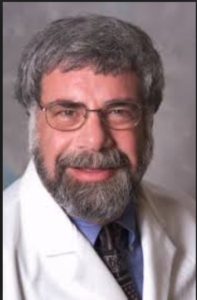
Charles Alpers, MD Interim Chair of Pathology
The next major event occurred last January. I received a phone call from my new (interim) chair, Charles Alpers. Dr. Alpers informed me that I was under investigation by UCIRO, the office comprised of UW attorneys specializing in issues of abuse, for unspecified actions. The next day I learned that I was being charged with homophobia, racism and sexism. Moreover, in violation of University rules requiring faculty review of such a punishment, Dr. Alpers told me he had removed me as director of the training grant. He did this, apparently in the perception that the same Center Director would become the new Principal Investigator. That perception was wrong. The Director is a bright man and is well-regarded for work in cardiology, but he is not a vascular biologist. The NIH made that clear. The grant was left with no Principle Investigator for two months.
UCIRO is the University’s investigative bureau. Founded originally in response to demands by female faculty, the office was oddly placed under the Office of Risk Management, reporting to Vice Provost Steve Olswang. Because of the obvious conflicted interests, UCIRO now reports to President Cauce. All of the investigators are UW lawyers, in that is they have JD degrees, but claim NOT to be bound by the Washington State Bar. Since its original intent, the purview of UCIRO has been expanded to include scientific misconduct, harassment, all forms of federally mandated issues of bigotry, e.g. prejudice based on gender, religion, race or age. During my process I requested that UCIRO investigate my claims of harassment. They refused saying that only Dean Ramsey or President Cauce could instate such an investigation.
Given my personal history, this attack was devastating! I had no idea what this was about and had had no prior notice. I eventually learned that the charges had been filed by Dr. Alpers, based on a letter he had received written by my administrative assistant. Reading emails obtained through a public records request, I learned that even this letter was written after a UW lawyer working for the Dean told Dr. Alpers that he should have direct quotes. The letter, written subsequently, put terms like “fucking nigger” and “fag” in my mouth. Whatever motivated my administrative assistant to write the letter, he immediately quit the UW. The assistant described an ugly management situation in Pathology and refused to participate in the investigation. After four months of investigation UCIRO found no basis for the charges in the letter, including no witnesses to the report that I use such slurs. Nonetheless the personal damage done by the investigation itself was and is immense. I have had colleagues and students ask me whether I had really done these things and one student has refused to meet with me because she has been told I am a sex pervert.
While I cannot prove that these events stemmed from the threats made at SLU, I have other reasons to be concerned. For example, since my work was at SLU, I know that the Chair would have had to have gone to the Director for information. For reasons that were never made clear to me, Dr. Alpers had required my administrative assistant to report to this Director. I also have since heard from colleagues that this Director had been involved in the effort to have me subjected to this investigation and had told at least two colleagues that I was under investigation for abusive behavior months before Dr. Alpers informed me. Despite his role at SLU and his knowledge of the decision to take these actions, the Director has not once come to me about the issue as might be expected given his role as head of the Center, my assistant’s supervisor, or my colleague.
Again, I do not know that my suspicions are correct but, given the refusal to have UCIRO investigate my concerns, is it reasonable to want to know how the letter got to be written? It is at least reasonable to use a counselor for Human Resources to resolve the interpersonal concerns.
GROWING UP
I have special reasons for being angry at the charges that I am a bigot.
.jpg)
The river in the front is the Neponset. A few blocks from out house, the Neponset powered a fabric mill a few blocks from our house. The mill provided jobs for many of my Dad’s patients.
.jpg)
Elihu Greenwood Elementary School. In the 5th grade, Miss O’Brien gave me the rattan after her boy friend, the shop teacher had an infarct. Since I had figured out that the rattan made more noise then pain, she went through three of things, breaking them over my hand, before she gave up.
I am Jewish. I grew up as the son of a family physician in Hyde Park, a lower class, Irish-Italian part of Boston. My mother chose Hyde Park because she felt Jews should not live in Jewish neighborhoods and my parents did not have much money. Anti-Semitism in Hyde Park in the 40s was all too real. When my parents bought their house prior to WWII, our next-door neighbor was active in the American Bund. My parents received death threats even after my Dad returned from his Army service in WWII where he played a heroic role in the liberation of Buchenwald. Some patients avoided my Dad’s office because he was the Jewish doctor. Other patients came to our home, his office, for just that reason! I knew little of this until, one day on the way home from elementary school, the neighborhood kids stoned me as a “Christ Killer”. They had been taught this by the nuns in catechism classes attended by all my classmates. Later, in the fifth grade, I was beaten with a bamboo stick by my Catholic teacher after her male friend, the shop teacher, had a heart attack. I assumed this was because I was the only non-Catholic kid in her class. And yes, I was called “kike” and “fucking nigger.”
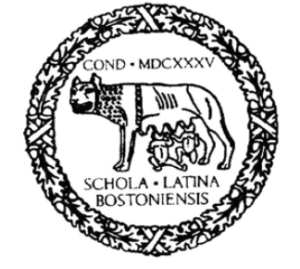 Life in Hyde Park was not all bad. Leaving for school in the morning, I often found homemade cannoli, tomatoes or wine on the stoop. While we did not celebrate Christmas, some of my Dad’s patients would gift us kids with small presents that we found in stockings hung by the fireplace. I also made friends at school and learned a lot about life as a minority. Father Joe, the parish priest, became a special friend. He even secretly gave me last rites when everyone expected me to die from an abdominal bleed at age 12!
Life in Hyde Park was not all bad. Leaving for school in the morning, I often found homemade cannoli, tomatoes or wine on the stoop. While we did not celebrate Christmas, some of my Dad’s patients would gift us kids with small presents that we found in stockings hung by the fireplace. I also made friends at school and learned a lot about life as a minority. Father Joe, the parish priest, became a special friend. He even secretly gave me last rites when everyone expected me to die from an abdominal bleed at age 12!
There were no other Jews in Hyde Park and certainly no African Americans! I first learned about being black when I attended an elite public high school. Because I had high grades at Boston Latin School, I was invited to join an elite club. I refused after my Dad explained to me that the club excluded my African American friends.
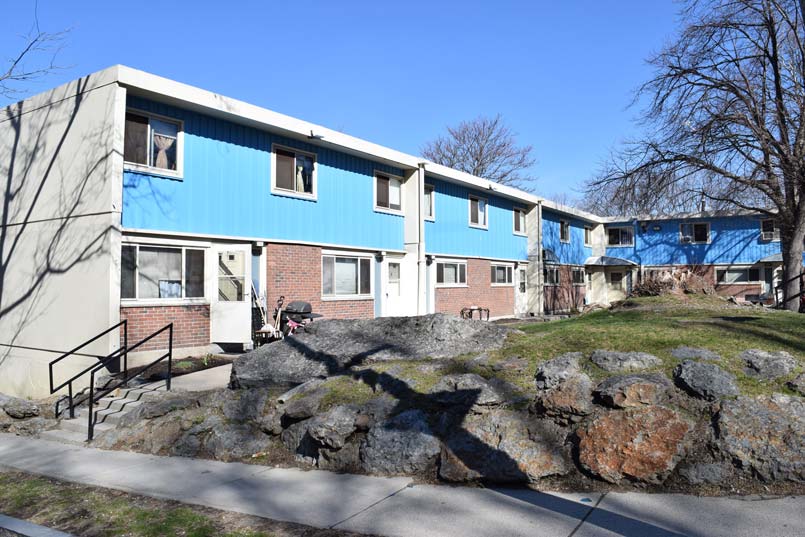
Academy Homes was wonderful. We chose it because of the low rent, something we could afford on my wife’s pay as a technician at MIT. We were one of only two families who were not African American. The friendship of our neighbors gave us a life long desire to be close to the black community.
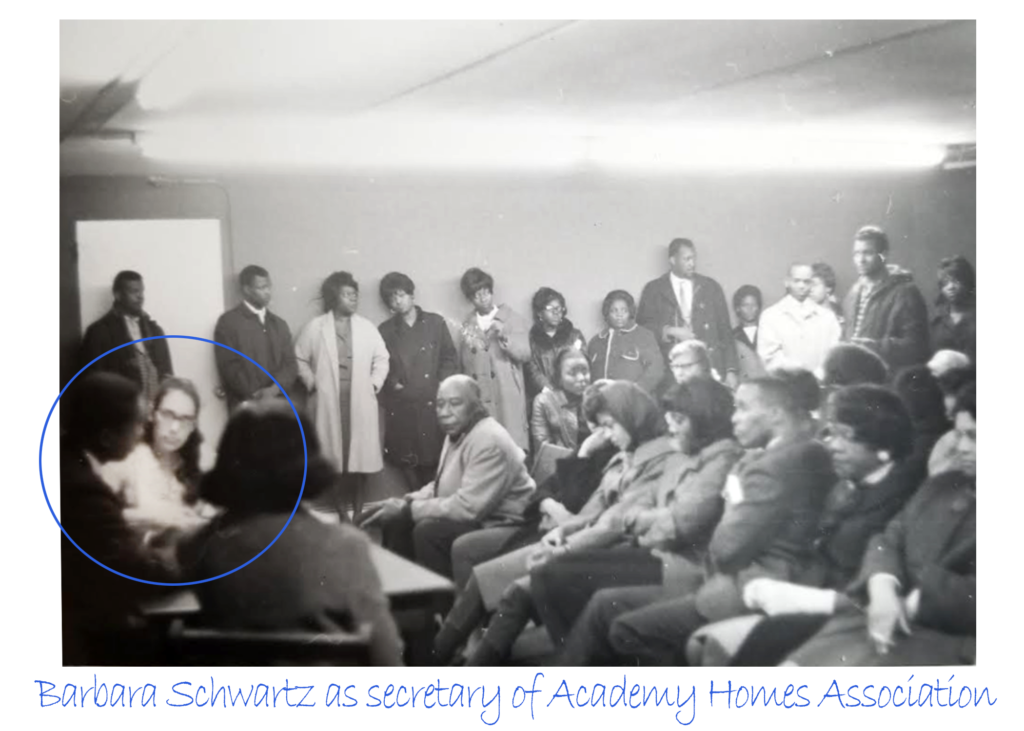
Academy homes was an education in itself. Barb served as secretary of the Tenants Council. One of the biggest fights was trying to keep a liquor store out. Bill Russell, THE BILL RUSSELL, wanted a store in our commercial space. The Council fought all the way up to the office of our Senators. Sadly, Ed Brooke, a Republican and the first African American senator since Reconstruction basically ignored us. Ted Kennedy got involved and the liquor store never happened.
Many years later, my wife and I moved into Roxbury, a Black neighborhood, but we found that most of our family were afraid to visit us! It was upsetting to learn that the Boston cops would not answer phone calls from Roxbury. My wife and I got to meet a nice Jewish social worker who came and tell “us” how to keep our homes clean!
I went on to school at Harvard College and then Boston University School of Medicine. At Harvard I was active in the Students for a Democratic Society. BU was interesting because even though there were no black students, most of my patients were poor black folks living in the South End. Taking genetic histories taught me a lot about the Great Migration from the South and about the horrid breeding practices during slavery!
COMING TO SEATTLE, THE BEGINNINGS OF VASCULAR BIOLOGY
When I graduated from BUSM, all MDs were being called to serve in Vietnam unless we got a deferment for advanced training. I learned that pathology could give me a five-year deferment, so I signed up for the US Navy as a pathologist. The five years let me combine a PhD with residency in pathology at the UW. My PhD research was very exciting. Using the new tools of cell culture and electron microscopy, I became one of the founders of the new field of vascular biology. My mentor, Earl Benditt, tried to dissuade me. Famously, Earl said that I was wasting my time, “vessels are just plumbing.” Earl was wrong.
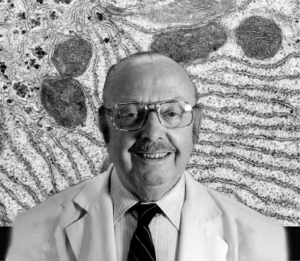
The electron micrograph behind Dr. Porter shows the “cytoplasmic reticulum.” If you look very carefully you will see little dots attached to these membranes. The dots are the ribosomes, the place were RNA is translated into proteins. Porter’s discovery led to a Nobel Prize. Nobel prizes are limited to only three persons per award. Unfortunately, the Nobel Committee gave only one prize for ALL of cell biology. George Palade, who worked with Porter, was one of the three recipients and spent years publicly apologizing for the Nobel slight to Kieth Porter.
I had actually begun working on vessels in college. I was very lucky to be one of the first students to work with Keith Porter when he came to Harvard. Porter was the major force behind electron microscopy. With the electron microscope and new high-speed centrifuges we could see things no one had ever seen inside cells! Porter’s work was a key part of a new field in biology called “Cell Biology.”
My application to work in Porter’s lab was based on ideas that I hand about the lining of blood vessels and how proteins could cross the lining cells, the endothelium. My grades were not great, and I did not expect Dr. Porter to accept me. I was lucky. My ideas contradicted the claims being made at the time and Dr. Porter liked my attitude! Porter chose me as one of 12 students to work on the regeneration of nerve cells. The students in his lab, 12 of us, got to be authors on a paper with Dr. Porter. Unfortunately, Porter misspelled my name!
In medical school my interest in blood vessels continued when I found a way to hide from boring (to me) clinical classes at Boston University. I snuck over to Harvard where I worked with Guido Majno. Again I had an idea about blood vessels. This time my idea was about the stuff endothelial cells sat on. In the electron microscope the stuff looked like a gray fuzz but I thought it was collagen and showed I could digest it with an enzyme called collagenase. Sadly, after I left his lab, Majno published my work without my name! As I became well known, Guido, now a friend, apologized but he was always embarrassed by this mistake on his part.
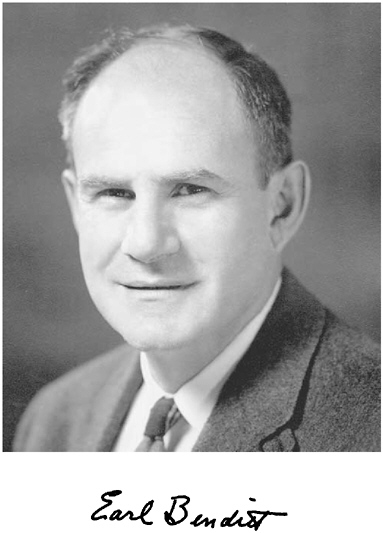 It was my first mentor, Keith Porter, who suggested I go to Seattle and study Pathology. Besides the issues associated with avoiding service in Vietnam, Porter knew about the work Earl Benditt was doing here creating a new face of Pathology built on cell biology. So I came here, wrote my thesis on how things get across endothelium and went on to help found a field of biology … vascular biology. Besides Earl, I got to work with, learn from .. and sometimes compete with .. key UW people like Ed Smuckler, Russell Ross, and David Lagunoff. In 1973, Michael Gimbrone from Harvard and I founded what later became the North American Vascular Biology Organization.
It was my first mentor, Keith Porter, who suggested I go to Seattle and study Pathology. Besides the issues associated with avoiding service in Vietnam, Porter knew about the work Earl Benditt was doing here creating a new face of Pathology built on cell biology. So I came here, wrote my thesis on how things get across endothelium and went on to help found a field of biology … vascular biology. Besides Earl, I got to work with, learn from .. and sometimes compete with .. key UW people like Ed Smuckler, Russell Ross, and David Lagunoff. In 1973, Michael Gimbrone from Harvard and I founded what later became the North American Vascular Biology Organization.
Cell biology revolutionized the biology of blood vessels. With electron microscopy we could actually see the cells that line vessels, structures thinner than Saran wrap. Cell culture tools let us grow the cells and then do biochemistry to understand how the cells function. Over the last four decades, vascular biology has accomplished a great deal including lengthening the human life span by five years, new treatments for atherosclerosis, new treatments for cancer and four Nobel prizes. Our program at UW included several premier faculty in Pathology, Biochemistry, Physiology, Pharmacology and Genetics. My own research, while certainly not winning a Nobel, was very well funded, including large multi-investigator research program project grants and national centers under my directorship. Even Dr. Benditt began working on blood vessels! Other amazing work by Ed Krebs, Eddie Fischer and Joe Goldstein led to Nobel Prizes for cell signaling and atherosclerosis.
RETURN FROM THE NAVY, TEACHING IN ALASKA AND VASCULAR BIOLOGY IN SEATTLE
WWAMI graduates. The program is rated as #1in rural medicine in the United States. UW leadership in this field has also led to a premier role worldwide in global health.
After completing my residency and PhD, I served in the Navy as a Pathologist in Long Beach, California. Whoever 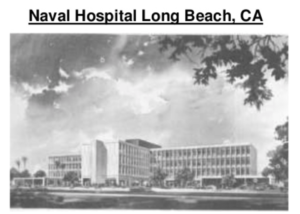 made up the charges that I was homophobic should have spent time with me in the Navy before Don’t Ask, Don’t Tell. A lot of the enlisted men in my lab were gay. Oh, and while it is not relevant to what names I might call someone, one of my responsibilities was to be the autopsy pathologist for Richard Nixon if he had died in Southern California!
made up the charges that I was homophobic should have spent time with me in the Navy before Don’t Ask, Don’t Tell. A lot of the enlisted men in my lab were gay. Oh, and while it is not relevant to what names I might call someone, one of my responsibilities was to be the autopsy pathologist for Richard Nixon if he had died in Southern California!
Most of my science happened after my service in the Navy. Earl Benditt recruited me back to Seattle as an assistant professor of pathology. In that role, I had many opportunities. These included helping create the UW’s WAMI program in rural medicine. Finding faculty in Fairbanks to teach the molecular basis of disease was quite a challenge.
Central to developing the UW program in vascular biology was my role as the Principle Investigator of a large and very successful NIH training grant called “cardiovascular pathology” (CVP). The UW laboratories of vascular biology became prime sites for training new investigators in this new field. Currently at the University of Washington, the director of our stem cell center, the chair of bioengineering, the chair of pharmacology, director of research at the Puget Sound Blood Center and the director of cardiovascular regeneration at Children’s are all graduates of my programs, three from my own laboratory. Other UW vascular biology graduates went on to establish programs across the US as well as in Europe. One of my own protégés is now the head of the Nobel Foundation! Others lead major labs in Virginia, UCLA, University of Cambridge and Amsterdam.
At our recent competitive renewal, CVP earned a rarely seen perfect score and was renewed for five years. I am told we are rated as one of the top programs at the NIH. I am so proud of the UW and the role we have played!
HOW I FEEL ABOUT THE UW ACCUSING ME OF CALLING AFRICAN AMERICANS “FUCKING NIGGERS” OR USING THE WORD “FAG.”
My time at the UW also made it possible to continue my commitment to civil rights. I became interested in the local indigenous peoples and played a very small role in the occupation of Fort Lawton (now Discovery Park). Our children grew up proud of the history of Chief Seattle and the heritage of the first peoples in this wonderful place. Our seven-year-old granddaughter, living in Oslo, will learn to read the symbols of coastal art when she joins us cruising across the Salish Sea.
As our kids grew up, my wife and I also were able to convince the Seattle Public Schools to create the “Kindergarten Project.” The Kindergarten Project was an effort to take advantage of the fact the kids in Head Start were ready to read before going to Seattle Schools. We saw Head Start as a great chance for all kids to take advantage of a time when underprivileged kids, largely black kids, ranked ahead of their white classmates! Later, as the parent leader of the District’s program for the academically gifted kids, I launched an effort to recruit talented black kids to our program.

David Gordon was quite an experience! He came to my lab from Morris Karnovsky’s lab at Harvard. Morris was a dear friend and a pioneer in vascular biology. David’s work as a fellow was excellent, but! The but was David’s love for teaching. One night walking through our teaching wing, I heard sounds of students. I looked ion the lab and most of medical school class was sitting on the floor of a lab while David tutored them in pathology. I wanted David’s full efforts at the bench! But David explained to me that the black students at the UW had come to him for help. Then the white kids heard about this great teacher! “What was I supposed to do?” David said. Beside his job in Ann Arbor, David now is also the inaugural dean of the new College of Health Professions at the University of Michigan-Flint.
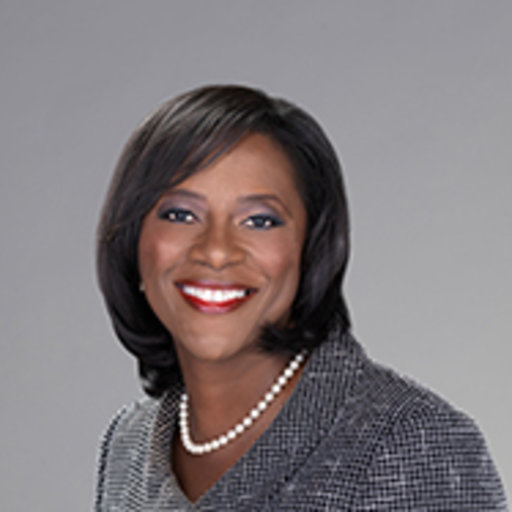
Sandy Harris was one of my first fellows. Sandy interested me because she had trained as a chicken embryologist and I wanted to use eggs to work on blood vessels. This was quite an experience for her. She had never been outside of the south and was amazed that no one in Seattle cared about her skin color. She left here to go back to Morehouse School of Medicine where Sandy is now Vice President & Executive Vice Dean, Research & Academic Administration
I also used my academic status to teach not just at UW but at the Morehouse Colleges in Atlanta and at Tugaloo in Mississippi. African American protégés from my own lab went on to become the Vice President & Executive Vice Dean, Research & Academic Administration at the Morehouse School of Medicine and Associate Dean for Minority Affairs at the University of Michigan School of Medicine. At Morehouse I also played a role in recruiting Dr. Gary Gibbons to head their research program. Gary, a Cardiologist and an African American, went on to the National Heart Lung Blood Institute where he now serves as Director.
Another friend from Morehouse is Dennis McLeod. I met Dennis during a teaching visit at Morehouse College. That is the undergraduate school for men at the Morehouse Colleges. What an amazing place! Great kids with a work ethic and pride we really do not see here on the all huge UW campus. Dennis was an undergrad and we became good friends. He had some problems adapting to the UW where being black usually means being an athlete. I suggested he stat wearing a Morehouse sweatshirt. White kids starting to come up to him asking if he knew Spike Lee! Dennis finished a PhD in Psychology and has now gone on to practice as a clinical psychologist in Florida!
Perhaps most satisfying to me, I have successfully worked with Dr. Moses Williams of the STEMPREP program. STEMPREP is a national program for highly achieving elite students from under-represented, largely African American, backgrounds. Beginning in middle school, Moses mentors his students and provides summer programs for them. 100% of Moses’ students graduate from college and 83% go on to doctoral degrees! As of last year, Moses’ students are taking their 7th and 8th grade precollege training at the UW and some have gone on to matriculate as UW undergrads. Again, Dr. William’s decision to relocate to the UW made me very proud of the UW!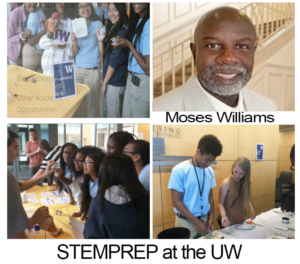
Sadly, I decided to cut back the effort with Dr. Williams after the UW’s attack on me. I did not want to hurt his efforts. I have asked the UW to help repair this relationship as well. Again, my request has been refused!
Even my life as Jew has been affected by this history. My wife and I have been members of different synagogues, choosing to move because we wanted to belong to a Jewish community that saw civil rights as central to our people. We currently belong to a small synagogue, Kadima, which shares space with two Black churches. Kadima has a number of LBGTQ members and, it is fair to say, is a synagogue with a major commitment to gay rights. You can imagine how this made me feel when I was attacked by the UW for using the word “fag!”
So, no .. I have never called anyone a “fucking nigger!” or a “fag.”
CONFLICTS WITH THE UW OVER CIVIL AND ETHNIC RIGHTS
I have also played a modest role in a number of fights over rights at the UW.
 Several years ago, a disabled employee of mine came to me requesting a reasonable accommodation. Knowing about the Americans with Disability Act, I assumed this would be an easy issue. I arranged a meeting with human resources. To my horror, the UW representative, in my presence, threatened my secretary that she would be fired if she continued to push for this accommodation. Given the extent of her disability, this might as well have been a death threat. I reported this UW official to my Chair. He responded by telling me the UW was going to fire the secretary and that I should lie about the meeting. I told him that as a Jew, I do not lie. The Chair responded that truth telling “belonged in the synagogue.”
Several years ago, a disabled employee of mine came to me requesting a reasonable accommodation. Knowing about the Americans with Disability Act, I assumed this would be an easy issue. I arranged a meeting with human resources. To my horror, the UW representative, in my presence, threatened my secretary that she would be fired if she continued to push for this accommodation. Given the extent of her disability, this might as well have been a death threat. I reported this UW official to my Chair. He responded by telling me the UW was going to fire the secretary and that I should lie about the meeting. I told him that as a Jew, I do not lie. The Chair responded that truth telling “belonged in the synagogue.”
The employee went to the UW Ombud and was informed that the only way to keep her job was to file a complaint against me, claiming harassment. Given no choice, she did this. The complaint included sexual issues and, I guess because she was also Jewish, charges of anti-Semitism.
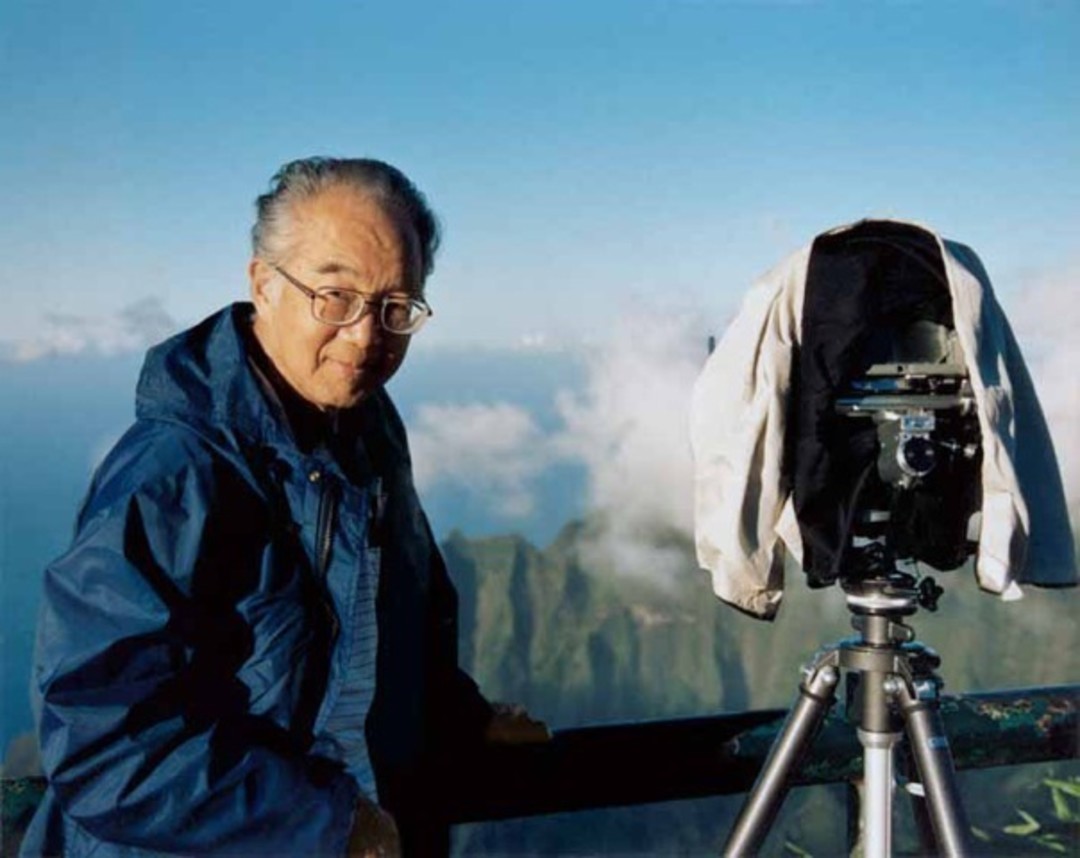
Johsel Namkung has also been important to my life in another way. Back when I worked in Keith Porter’s lab, I learned that electron microgrooves needed to be printed by an expert. I taught myself the zone system and became enough of a serious photographer that I have taught art photography at UCLA and exhibited. For me, Johsel was a great chance to learn. This was not just technical. He had a way of seeing things that amazed me.
A UW lawyer contacted me and informed me I was under investigation. I was informed I was not to talk to anyone, including my wife or an attorney. I immediately contacted my personal attorney and he recommended I hire a prominent attorney with expertise in civil rights. My wife and I chose Hal Green because Hal had worked with Ken MacDonald, a prominent civil right attorney who had defended a dear friend of mine, Johsel Namkung. Johsel, a refugee from Korea during the Park regime, was charged with being a communist by the House Un- American Activities Committee. Johsel had been a prominent member of the Seattle arts community and a major photographic artist. I met him because he worked in Pathology at the UW as our Department photographer. I was lucky to learn some photography from Johsel and he printed many of my electron micrographs!
Hal charged us, in addition to his other fees, $15,000 for his own efforts to become an expert in the Faculty Code. As a result, I have, over the years, become an amateur code expert.

Steve Olswang
That UCIRO investigation, like the current one, found me innocent. Nonetheless, presaging my current experience, in front of my wife, Steve Olswang, then Vice Provost and a lawyer whose work for the UW often was to intimidate faculty, threatened to use the full resources of the UW including the UW attorneys, against me. Olswang went so far as to inform me he would use its legal resources to remove my tenure if I refused to perjure myself in regard to the employee. According to Olswang, he was acting within the Code. Having attorney Green as our back up, I knew Olswang was lying. We told him that we had determined that we could afford our own attorneys by mortgaging our home on Capitol Hill.
Olswang also ordered an audit of my research funds. This led to the University’s repaying several thousand dollars that it had improperly taken from my accounts. Olswang wrote and circulated a letter around campus falsely claiming that I was under psychiatric treatment for an anger disorder. He based this on accessing my UW email and observing that I was seeing a psychiatrist!
This all ended only when a friend at the Seattle Times leaked the information that he was conducting an investigation of the story. I received an apology. While damage was done, I also acquired a reputation among faculty for standing up for my rights. Since that time, I have frequently been consulted by faculty who felt they were being mistreated by the University administration. Again, despite Dr. Olswang’s apology, I never received any apology from the School of Medicine.
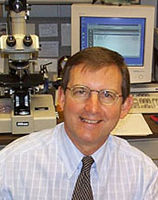
Roger Haggitt
At another time I found myself defending the rights of a Chinese graduate student. A resident in Pathology, a young physician from Taiwan, murdered Roger Haggitt the head of Surgical Pathology and then committed suicide. My student saw this as a stain on all Chinese people. He even posted a picture of the dead resident above his desk. A technician, a white person in my lab, claimed that the student had threatened her life. The University took the technician’s side, insisting that the student be barred from my lab. When I investigated, I found another student in my lab had overheard the supposed threat. This student denied the technician’s story. Worse, in an interview with me, the technician repeated her story claiming that “you cannot trust Chinese people because they are Communists and do not believe in God like us.”
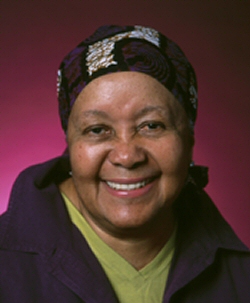
Millie Russell
Seeing this as intercultural issue, I contacted a friend in the President’s office who served as the advisor on minority affairs. The friend, Millie Russell, is a very wise woman whom I respect greatly and had worked with on issues facing African American students. Millie had also advised our children when, at age 14, they had entered the University’s Early Entrance Program. I assumed that Millie could find someone in the President’s office with expertise needed to deal with the cultural issues for our growing community of students from China. My lab met, and we decided to request ethnic counselling for all of us. I saw this as addressing the issue without confronting the technician. Millie was told that Chinese students were not considered a minority and that she could not help us.
The School of Medicine arranged a meeting for the student with a person from HR. In my presence, the student was threatened with loss of visa and expulsion from the US. The student’s marriage broke up. To make matters worse, the UW obtained a bitter letter the student had written to the Seattle Times. To be fair to the UW, the student by this time was quite bitter and the letter was threatening. There was reason for concern, but no qualified person talked to the student. Instead, based only on the letter, a panel of UW psychiatrists determined that the student was mentally ill. The UW issued an order for my student’s arrest. Wanted posters were placed on campus.
Having fled China at a time when treatment of dissidents was terrible, the student was thoroughly frightened. He believed that he would be imprisoned if forced to return to China. He went into hiding. I was asked to bring the student to meet with King County mental health officials. I agreed on condition that I be present. I made contact with the student and brought him to the meeting. The meeting was attended by large number of UW officials and an intimidating force of UW police. The County officials conducted an interview. They found the student healthy and castigated the UW for its behavior. Subsequently, the student went on to earn a PhD and is now a working scientist at the Hutch. No action was ever taken about the racist technician who had created this problem. To its credit, the UW did help by paying for a psychologist to help my student through this trauma.
When I served as Faculty Senator, I also tried to promote the rights of American Minorities, especially African Americans. I was appointed to the Council for “Multicultural” Affairs. I use the quotes because I was disturbed to see only one African American, Clarence Spigner, on the committee. We had no Mexican Americans, and no Northwest Native Americans on the Council. Nonetheless, Clarence and I managed to get the council to pass two motions. The first asked the Athletic Department to explain why the UW did not include academic success in its efforts to recruit athletes to the basketball and football teams! The second motion was addressed to the Administration and asked them to consider partnering with Morehouse or another leading minority university to improve the attractiveness of the UW to elite students from underrepresented minorities.
The outcome of these not very radical proposals is that the Council was suspended. A year later, when the Council was reconvened, the motions had mysteriously disappeared from the minutes and the Administration claimed they had never been made. However the experience did turn ot well for me because I got to meet a remarkable man, Anthony Washington. I met Ant when he was working as line cook at the UW Food Services cafeteria in South Lake Union.
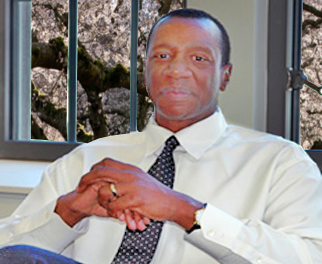
Ed Taylor, vice provost and dean of Undergraduate Academic Affairs at the University of Washington
What was weird was this seven (nearly) foot tall guy trying to duck under the hood so he could flip burgers. I learned that Ant had been recruited to the UW as a Husky basketball forward. He had been “helped” along at Garfield, earning a 2.3 GPS and being told to avoid AP classes because he was going to the NBA! Seattle newspapers called Anthony the next great NBA player.
Unfortunately, when Ant broke a heel bone he was pretty much mistreated by the UW Athletic Department and forced to leave the UW. They would have let him stay at the UW, not playing basketball, but without any effort to get him into classes that might have led to a new career. Ant left and tried to make a life in semi pro basketball.
As I got to know Ant I realized that he is one of the brightest people I have ever met. With some help from Ed Taylor we got him back into the UW where he finally got his BA, graduating with a 4.0! Now, with support from the Seattle Public Schools, Ant is teaching in a Seattle school while doing his Masters and PhD at the UW!
Ant, along with his kids and family, have become close friends. They are great. Oh, I forgot to mention that Ant is now a writer for THE Ave.
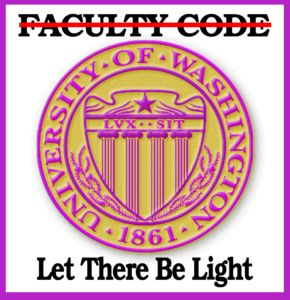
Click the image to go to posts about abusive functions of lawyers working as administrators at the UW and other public universities.
CURRENT STATUS.
At the beginning of the process I asked UCIRO to determine how an accusation of me had come to be written. UCIRO refused, saying that they had first to determine if I had done the things charged. They investigated for over 4 months but found no evidence to support the charges. I was exonerated. I again asked for them to complete the investigations by determining whether UW rules had been violated by charges being made as a form of harassment. UCIRO refused, telling me that such an investigation could only be ordered by the Dean or by the office of the President. Both have refused. In other words, UCIRO tells me that complaints against the Dean can only initiated by the Dean!
I have been reinstated as Principal Investigator of the training program, but the Department has refused to make any accommodation for the damage resulting from the false charges. This includes refusing to provide financial support to repair damage for the very long period when the grant was without administrative support, support for my moving the program out of SLU, or support for my continued effort to work with STEMPREP to recruit elite minorities to the UW. Perhaps most telling, Dr. Alpers has refused to meet with UW mediators to discuss these matters or to work with qualified people from Human Resources to address harm done by the process. In what I see as an act of retribution, Dr. Alpers has taken this occasion to lower my rating from “outstanding” to “without merit.” The result is that this year I will be deprived of the annual raise given to all other members of the Department. Finally, I have found that Dr. Alpers may have misappropriated over $60,000 of my own funds that could have been used to address the damage. As a result of all this, it is very likely that this grant, after being rated as amongst the most successful programs at the NIH, will not be able to be renewed.
I have requested a direct meeting with the Dean Paul Ramsey. The Associate Dean, John Slattery, has told me that Paul may not even know my story. Dr. Slattery tells me that this case has likely been handled entirely by the legal staff. I am currently trying also to get to the Dean through mutual friends outside of the UW channels.
I have learned that the actions taken against me were enabled by changes made to the Faculty Code. With help from my attorney, David Corbett, an expert in UW Faculty Code, I have learned that these changes were made in violation of the process requiring a faculty vote for substantive changes to the Code. Moreover, a colleague of mine chaired the Senate committee that is supposed to determine whether such rule changes are routine or require a vote. He tells me that Vice Provost Cheryl Cameron, made the claim that these changes were necessitated by rules of the National Institutes of Health. My grant managers at the NIH deny this.
Despite all this the UW attorneys insist that Drs. Alpers and Ramsey’s actions were proper. Apparently the Senate does not agree. After a review of my attorney’s work and reviewing similar cases brought to the Senate by the current Secretary of the Faculty, the Senate is now working to repair the Code. As a result, we are now in the process of chapter 28. This is a campus legal procedure, required before bringing matters before the state Superior Court. If we are successful, the Faculty will demand changes in the code and that appropriate assistance be given to repair the damage done to me. The final decision will be up to President Cauce.
LARGER ISSUES, ABUSE OF “SHARED GOVERNANCE”
It has also become clear that I am not the only victim of this sort of behavior by the UW administration. I have heard that abuse of UCIRO is a common tool used to get a faculty member to comply with some intent of a chair or dean. I have even asked several times whether all this was an effort to ask me to end my tenure. I got raised eyebrows but no answers.
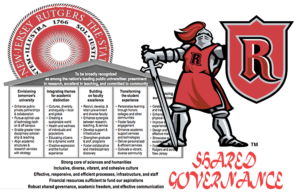
This graphic from Rutgers illustrates the concept of shared governance. The UW is no better.
All of this is part of the larger issue of how the UW is governed. While we do not have a union, the UW faculty does have a Faculty Code. A big reason for the Code is to assure that the faculty hold itself to high ethical standards, something that Tom Daniels of Biongineering has argued has failed. As Tom wrote, the failure is not because we have a Senate, but because the Senate does not do its job very well. The Code is written by the Faculty Senate, determined by faculty vote and affirmed by the President and Regents. UW faculty do not have separate contracts. The Code establishes the rules for everything from intellectual property, to promotions, and salaries. Tenure, the status of non-tenure track faculty, academic misconduct and issues of harassment are all also covered by this Code. All that, however, is done without the support of lawyers who work for the faculty rather than for the administration. The result is a Code that functions more to protect the administration than it does to assure ethical behavior by our faculty.
The mythology is that the UW Faculty Senate has shared authority with the Administration. This authority is called “shared governance” and, in theory means that the Senate is supposed to watch over all academic activities by the UW. I say “mythology” because as much as I would like to believe in the concept of the Senate and despite the great efforts of a few faculty activists, in practice the UW Faculty Senate has become largely meaningless. Very few faculty want to serve as Senators and few of the Senators, at least in the School of Medicine, ever even meet with their constituents to discuss Senate issues. Elected Senate officers, the Chair and Vice Chair, serve for only a year, making it unlikely that much can be done. The Senate committees have no staff other than what the Administration provides. Controlling information, especially when it comes to matters of law, means that the Administration usually gets its way.
Even major issues facing the Senate rarely get much discussion. Senate meetings are poorly attended, and faculty do not even usually get the agendas. Discussion occurs only when some determined faculty member puts a lot of effort into publicity via UW email or via the listserv maintained by the UW chapter of the American Association of University Professors (AAUP). For example, the AAUP listserv played a role several years ago when Professor Duane Storti led an effort to change UW salary policies. The UW Faculty Senate lacks a blog or regular newsletter.
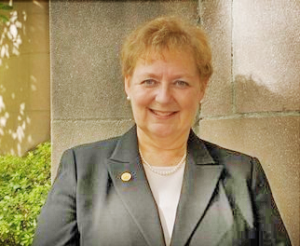
Marcia Killien. Dr. Killen herself has been an administrator, serving as Dean of the UW’s outstanding Nursing School. The question I would ask is whether any non-lawyer can fill the job of Secretary of the Faculty?
One Faculty officer, the Secretary of the Faculty is potentially powerful when to comes to issues of the Code. Unlike the other elected officers, the Secretary of the Faculty serves for an undetermined term and has the responsibility to advise faculty and the Senate on their rights under the Code. Unfortunately, in the almost fifty years I have been here, only two Secretaries have been attorneys. In my Chapter 28 case, the Secretary of the Faculty, Marcia Killien, a former Dean of Nursing, agreed to changes in the Faculty Code based on false claims that these changes were required by the federal government. That legal opinion came from Vice Provost Cameron, an administrator who functions more or less as the UW’s chief legal officer. Provost Cameron holds a Juris Doctor and served previously as an assistant to Provost Steve Olswang. As provosts Steve Olswang and Sheryl Cameron presumably come from the faculty. However, their faculty ties are tensuous. For example, Sheryl Cameron has a tenured position as Professor of Dental Hygiene but her record at UW is mainly acting as a lawyer. Her predecessor and mentor, Provost Olswang, held a similar academic position although, at least as I remember, Steve Olswang was given a position in academic policy.
UW lawyers like Cameron, Oswang, and similar lawyers who work for the School of Medicine, play a peculiar role. Despite holding law degrees, despite enforcing the law on campus, and despite frequently issuing statements of law, these lawyers can never answer the question “whom do you represent?” They cannot answer this because the Washington State Constitution says that state organizations can only be represented by the Attorney General. A consequence of this is that UW attorneys claim not be bound by the ethical codes of the Washington State bar.
My case shows the most obvious legal problems. Like other faculty I have been threatened by the Administration’s power to use its lawyers. The email chain obtained under a Public Records Request shows Dr. Alpers working with these attorneys to fashion his charges against me. The Associate Dean at SLU, John Slattery, tells me that it is likely that my case has only been reviewed by the lawyers, even to the point that they may have signed documents for the Dean or told him what he had to sign.
Even the Attorney General is no help. Despite nominally representing all the citizens of the State, policies of the office of the AG at the UW define the administration as the exclusive “client” on campus. Neither individual faculty members nor the Senate itself has access to the 40 attorneys employed by the Attorney General as Assistant AGs on the UW campus.
As for the Senate, how can it do anything with no staff and legal access under control of the administration?
THE AVE
Several years ago, I became frustrated with the lack of a forum for public discussions at the UW. This seemed to me to go beyond the needs of the Faculty Senate. The academic community needed a place to discuss the UW as well as the wider interests the faculty have. It seemed to me that our entire state would benefit from a forum like this.
I met with colleagues and created a blog. One of those colleagues was our current President, Ana Mari Cauce. Ana Mari came up with our name, ” THE-Ave.US.” We used that name to represent the ideas and interests of the UW community rather than the UW itself. Because The Ave is located off campus and uses no UW resources, it is uncensored and covers topics that would not be allowed on campus.
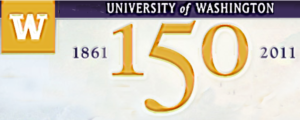 While few UW faculty have chosen to write for The-Ave, it is read by many faculty. Among issues The-Ave has addressed is the strange way the UW fails to celebrate its academic achievements. In 2011 the UW celebrated our 150th anniversary. The history published for that event celebrates our football teams greatly but leaves out the great artists, Nobel laureates, and writers we should be proud of. It is as if the UW were ashamed of its faculty’s achievements. I have wondered whether this lack of celebration is why the UW is so poorly supported by Seattle’s amazing community of successful business leaders. Is that why Michael Young, a highly accomplished academic and expert in business in the Pacific basin, chose to leave? At Texas A&M, his current perch, President Young heads a less prestigious school that shows immense pride in its achievements and gets great support from its business community.
While few UW faculty have chosen to write for The-Ave, it is read by many faculty. Among issues The-Ave has addressed is the strange way the UW fails to celebrate its academic achievements. In 2011 the UW celebrated our 150th anniversary. The history published for that event celebrates our football teams greatly but leaves out the great artists, Nobel laureates, and writers we should be proud of. It is as if the UW were ashamed of its faculty’s achievements. I have wondered whether this lack of celebration is why the UW is so poorly supported by Seattle’s amazing community of successful business leaders. Is that why Michael Young, a highly accomplished academic and expert in business in the Pacific basin, chose to leave? At Texas A&M, his current perch, President Young heads a less prestigious school that shows immense pride in its achievements and gets great support from its business community.
The-Ave has been very critical of the UW. This is especially true of the issues facing the treatment of minorities in the athletic programs and issues of governance. As THE Ave editor, I have been very interested in the proposal to create a faculty union. I have opposed a union because of concerns about faculty excellence. Nonetheless, as an academic, I am shocked about the abuse of non tenure track faculty. I wonder how many of Seattle’s liberal activists realize that these folks with advanced degrees may make less than the minimum wage? I do respect our President, but I am skeptical about the administration’s commitment to these faculty. Maybe we need a union?
My own experience makes me wonder. In the competitive world we live in, why should elite faculty choose a place run like this? Perhaps the public nature of The-Ave has made me a target.
WHAT NEXT?
My case is heading to a chapter 28 hearing and, depending on the outcome, perhaps to Superior Court. The total cost to me is likely to exceed $100,000. No one has explained to me what possible gain there is to the UW, other than destruction of a valuable program and, perhaps, covering up the illegal actions of the administration.